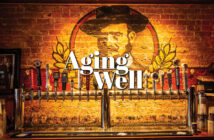| story by | |
| photos by | Steven Hertzog |
| OPEN A PDF OF THE ARTICLE |
These local businesses have adapted and thrived through the years thanks to hard work and generations of smart business practices.
“Jayhawk is basically a company that resulted from a weekend hobby that got out of control.”
–John Hardman, owner, Jayhawk Bowling Supply & Equipment Inc.
Bowling pins in a showcase at Jayhawk Bowling Supply & Equipment
Call them happy accidents. Chance successes. Finding a pot of gold at the end of a rainbow. Whatever the axiom or cliché, the world is full of entities that began with a kernel of an idea and, be it through fate, luck or a lot of elbow grease and persistence—and probably a combination of all of that—grew into long-standing, even iconic, companies.
Lawrence certainly isn’t immune from having many such businesses that call it home. They can be found in nearly every corner of town, businesses that have weathered up to seven decades of economic downturns, natural disasters and, most recently, worldwide pandemics. They’ve survived them with dizzying degrees of adaptability, to change with changing times, ebb with the ebbs and go with the flow. And they’ve done so with strong family ties and business processes passed down through generations of ownership.
Call them the happiest of accidents.
Companies such as Jayhawk Bowling Supply & Equipment Inc., which started in the early 1960s when Chuck Hardman arrived in Lawrence to be a night manager at Hillcrest Bowl and found there was no one there who could drill finger holes in bowling balls. Or Anderson Rentals & Equipment, which was birthed in 1946 when used furniture salesman Raymond “Andy” Anderson loaned the Eldridge Hotel folding chairs for a convention it was hosting. And there’s Cottin’s Hardware & Rental down on 18th and Massachusetts streets. Also founded in 1946, it got started in the early ’90s when Michigan natives Linda and Tom Cottin took the advice of a friend in Lawrence and chose to buy a hardware store here.
All three icons of Lawrence business survived and thrived over the decades through hard work, smart and flexible business decisions, and consistency of family lines and principles that hold up well to life’s curveballs.
They have another thing in common: a love for their businesses and what they do to keep them successful.
“I love what I do,” says John Hardman. “It’s hard for me to go on vacation, because I can’t think of anywhere else that’s as much fun as being (at Jayhawk Bowling Supply).”
Mary Anderson, second-generation owner of Anderson Rentals, who bought out her parents in the early ’80s, says, “This is such a great job. It’s different every day. It’s so much problem-solving.
“As a single mother, we would make the business place our family home. The kids would ride their bikes around the showroom. You learn so much every day about people, work, diplomacy,” she continues. “For me, it’s the perfect job.”
A drill press to put holes into a bowling ball; John Harman (center)with his sons (L-R) Nathan and Alex
A “300” Company
Chuck Hardman actually arrived in Lawrence from his hometown of Osborne, Kansas, in 1959 to work at Hillcrest Bowl, which today is called Royal Crest Lanes. When he discovered the bowling alley had no shop to drill out finger holes in balls, he asked the owner if he could start drilling bowling balls during his time off. He did just that in a tiny shed behind his mobile home until he incorporated in ’61 as Jayhawk Bowling Supply & Equipment Inc. The company has resided at several Lawrence locations before moving to its current spot on North Iowa in 1994.
Hardman created an original drill press that became so popular with bowling centers, the company eventually began manufacturing equipment. The Jayhawk Measuring Ball became the company’s first patent and was instrumental in building the business.
Today, Jayhawk Bowling Supply & Equipment Inc. is the largest manufacturer of bowling ball drilling equipment in the world, with 71 countries served.
Success didn’t come without some bumps along the way.
“The business was started with borrowed money,” says John Hardman, who started hanging around his father’s shop when he was about 7 and today leads the company with two sons working alongside him. “One of the hardest times came during the interest rate spikes in the early 1980s. Back then, it was all we could do to pay interest. We didn’t pay down any principal for years.
“We had to adapt a lot,” he adds.
When Jayhawk started, it sold balls, bags and shoes. In 1977, it got into surfacing—sanding, waxing and polishing bowling lanes.
“When lanes are well-oiled, scores go up,” Hardman says. “We got a good reputation.”
Jayhawk was one of four companies nationwide to get a parts contract from bowling industry behemoth, Brunswick, in 1981. It got out of the balls, bags and shoes business in 1994.
“The smartest thing we ever did was get out of balls, bags and shoes,” Hardman says. “When we started, there were 90 distributors, all selling the same ball. There was a contest to sell the cheapest. That’s a hard contest to win.”
Hardman says his business today is three-fold: a core business of manufacturing and selling specialty parts, supplies, lane machines for bowling centers, etc.; pro shop equipment (house balls and rental shoes, etc.); and capital equipment and service, such as remodeling bowling centers and installing pin-setting machines and automatic score-keeping. He says there’s even been an uptick in business one wouldn’t normally think about.
“We’ve built a lot of bowling centers in homes, which has been an interesting thing,” he says. “Bowling used to be a league-driven business, but it’s hard to find bowlers wanting to invest that much time anymore. The trend now is toward shorter leagues, family-friendly activities.”
Hardman also has enjoyed a stable employee base over the years and decades. In addition to his sons, Jerry Bailey, the company’s business manager, and his brother Terry Bailey, installation crew foreman, each have been with Jayhawk about 30 years.
If Jayhawk were to find itself in financial difficulties in the future, Hardman could consider selling some or all of his impressive bowling memorabilia. His office is filled with historic bowling pins, wooden bowling balls from the 1800s, 300 game rings and a watch engraved with bowling Hall of Famer Dick Weber’s name, among other things.
But he’s probably not sweating the future too much. He and the company celebrated 50 years of business back in 2011 with 170 customers from eight states in a huge soiree at the Kansas Speedway. And there are Nathan and Alex, the third generation of Hardmans, working alongside dad in preparation to take the company further forward.
Background: Anderson Rentals at the new location; left to right: Original location at 812 New Hampshire; Christopher Golden, Mary Anderson and Rita Holland stand with portraits of the Matriarch and Patriarch of Anderson Rentals; power tools to rent.
“We Rent Most Anything”
Little did her father know when he loaned those folding chairs to the Eldridge in the late ’50s that he had inadvertently invented a new type of business: the rental company. After the Eldridge job was complete, Mary Anderson says, he soon began renting furniture to dormitories at the University of Kansas then moved on to renting ladders and lawn mowers to local residents.
“There was the culture back then of buy and borrow,” Mary explains. “(Starting a rental business) solved a lot of issues.”
She says her father helped found and form the American Rental Association, today the largest international trade association for owners of equipment and event rental operations, and manufacturers and suppliers of rental equipment, with nearly $68 billion of business worldwide.
“Rental has become everyone’s emergency resource,” Mary says. “We have an interesting business because of the town we’re in. The young people at the university keep it that way.
“Our motto is: We rent most anything.”
Indeed, it might be an easier exercise to list what Anderson doesn’t rent as opposed to what it does. There are no NASA rocket ships, nuclear centrifuges or Noah’s Ark. Just about everything else you can find: dishes, tables, tablecloths, yard equipment, park benches, tools, even stranger items like bottle cappers and Old West wagon wheels.
And, oh yes, Porta Johns and hand-washing stations, which Mary’s son, Andy, says were business life preservers during the COVID-19 pandemic.
“During the pandemic, the thing that saved us was portable restrooms,” he says. “That, and hospitals needed hand-washing stations.
“Just the fact we have a little of everything helped us get through,” Andy adds.
The diversity of items offered for rent at Andersons has been helpful through all economic downturns during the past 70 years, Mary says.
“If the housing market is down, entertainment might be up,” she says. “If another area is hurting, there’s always something else that’s thriving, and we’re able to service that area, too.”
Mary says she bought out her parents in the company in 1982 and, in ’87, came on board as its CEO.
For years, Anderson Rentals was located at Sixth and Michigan streets, but the need to be closer to a major highway prompted the move to its current 18,000-square-foot location, at 2206 E. 23rd St., about 18 months ago. Andy, who says he’s the ninth generation of Andersons to be born and raised in Kansas, joins Mary and other relatives in the business.
He says there are five “non-Anderson” employees with the company.
Mary says Anderson Rentals’ future looks as bright as its past.
“People are always going to need tools,” she says.
Cottin’s True Value Hardware om Mass St;. 71 Staff at Cottin’s are knowledgeable about their products and they value their customer service
A Community Hub
Before it was Cottin’s Hardware, the company was owned by Bob and Barb Zimmerman. It actually was Bob’s father — Linda Cottin refers to him as “Mr. Zimmerman” — who founded the business in the 1940s as a blacksmith shop. In ’46, Bob and his brother, Lee, split the business into two separate businesses. Bob stayed with the hardware business at 18th and Mass, while Lee opened Zimmerman Steel Fabrication.
“That’s a telling story of the hardware industry,” Cottin says. “To survive, you have to change. Constant change is the key to survival.”
Linda and Tom were born a month apart from each other in Chicago, and both of their families bought and operated hardware businesses in the 1970s in Sturgis, Michigan.
“After our fourth child was born, Tom and three of his brothers and sisters were running the family hardware store,” Cottin says. “We knew we needed to buy our own store.”
The Cottins’ Lawrence friend, Bob Begluin, told them of a couple with a long-standing hardware store on south Mass Street that was looking to sell the business.
“We flew out of Midway (in Chicago) on the last flight before the airport shut down because of a blizzard,” Cottin says. “We landed in Lawrence, and it was 70 and sunny.
“Driving south on Mass Street, we got to the gazebo at South Park and decided we were going to buy (the hardware store) before even seeing it,” she adds.
Cottin says she and Tom took the keys June 1, 1992, and for the last 30 years have enjoyed making it a multiple-needs commerce hub for the Lawrence community. Cottin’s Hardware sells the usual: tools, home supplies, parts, garden supplies, etc. Over the years, they’ve also expanded services to include things like beekeeping and brewing supplies, as well as a weekly farmers’ market.
But it goes further than that.
“We’re a customer-service store that sells hardware,” says Cottin, who lived within walking distance from the store up until five years ago, when she and Tom moved to the country. “Selling hardware is the second thing we do. The first thing we do is help people. All of our longtime customers have been incredibly helpful and supportive.”
Cottin says the business has weathered all the various economic downcycles just fine. It was ahead of the curve on implementing mask-wearing and maintaining social distance at the outset of the pandemic, and also fared well with curbside pickup and telephone service.
“One of the beauties of a hardware store is we understood a hardware store is recession-proof,” she says. “If times are bad, people want to fix things. If times are good, people want to buy things.”
Most times have been good for the Cottins the last 30 years. But all good things must come to an end. Cottin says she and Tom plan to sell the business in five years. In fact, they already have a buyer, one of their former employees, lined up and ready to continue the legacy established by Zimmerman more than 70 years ago, of a hardware store that serves as a hub for all things community.
“We’re a neighborhood hardware store,” Cottin says. “But our neighborhood stretches far and wide.”




